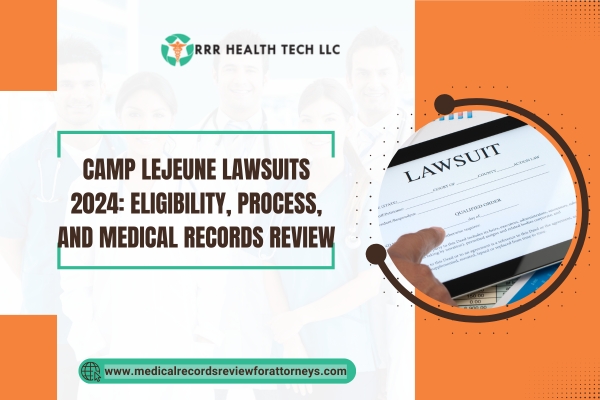
Introduction
In this era, the United States is witnessing various court cases being brought forth as a result of the water contamination at Camp Lejeune Lawsuits Marine stationed in North Carolina, with battles still ongoing in 2023. This Section is dedicated to individuals who were potentially exposed to this contamination and their attorneys. This guide will touch on the most recent news as of 2023, claims procedures, potential eligibility criteria, along with the significance of medical records in these cases.
Understanding the Camp Lejeune Water Contamination Crisis
Background of the Contamination
Toxic substances, including Trichloroethylene (TCE), Perchloroethylene (PCE), and benzene, were found in the water supply at Camp Lejeune between the years of 1950 to 1980. These substances have been linked to several serious ailments such as cancer and neurological disorders.
Health Impacts of Contaminated Water
Research has shown that individuals exposed to the contaminated water at Camp Lejeune face an increased risk of:
- Cancers: Such as breast, kidney, and liver cancer.
- Neurological Disorders: Including Parkinson’s disease and other cognitive impairments.
- Reproductive Issues: Such as birth defects and infertility.
Legal Landscape: Camp Lejeune Lawsuits
Recent Updates (2024)
As of 2024, the legal landscape surrounding Camp Lejeune lawsuits continues to evolve. Key updates include:
- Legislation Changes: Claims for affected individuals have been made easier with the introduction of new laws.
- Filing Deadlines: Time limits are key aspects that need a better understanding if possible claims would not be thrown out due to failing to meet time-wise requirements.
Who Can File a Camp Lejeune Lawsuit?
Individuals eligible to file a lawsuit include:
- Veterans: Those who served at Camp Lejeune during the contamination period.
- Family Members: Spouses and children of veterans who lived on the base.
- Civilian Employees: Individuals who worked at Camp Lejeune during the contamination period.
The Claims Process: Step-by-Step
Step 1: Gathering Evidence
For any petition to be taken seriously, it is important to collect sufficient evidence to include within the petition, and the collecting of such evidence, commences when;
- Medical Records: Linking health problems with the lockdown.
- Service Records: Evidence substantiating the claim that the claimant lived in Camp Lejeune during the lockdown.
Step 2: Filing the Claim
Once evidence is collected, the next step is to file the claim. This involves:
- Choosing the Right Legal Representation: Selecting an attorney experienced in handling Camp Lejeune lawsuits.
- Submitting the Claim: Filing the claim with the appropriate court or agency.
Step 3: Medical Records Review
A critical component of the claims process is the medical records review. This involves:
• Analyzing Medical History: The plaintiff lawyers will have to go through medical records with a view of connecting the source of contamination to the health conditions of the litigants/balancers.
• Expert Testimony: Involving medical professionals in the case in order to explain how the contaminants affect the health of the individuals.
The Role of Medical Records Review in Camp Lejeune Lawsuits
Importance of Medical Records
Medical records play a pivotal role in substantiating claims. They provide:
• Evidence of Diagnosis: Evidence that medically supports the health issues which the claimant alleges to have.
• Treatment History: Showing what treatment was done by who and what for.
How Medical Records Review Works
- Comprehensive Review: Medical records are carefully examined so as to get the necessary details that are supposed to be included in the notes.
- Summarization: The requested notions that the claimant would like to be presented as evidence are collapsed.
- Expert Analysis: Medical records are reviewed by doctors to draw connection to what may have caused the person’s condition.
Case Studies
Case Study 1: Veteran’s Health Complications
Overview of the Case: One such water was served at Camp Lejeune between 1975 and 1978 where he started having several health complications including kidney cancer and other neurological problems during and after service.
Challenges: It was difficult for the veteran to demonstrate the link between water contamination and his health problems as a lot of years have gone since he served last. As well, collecting a full pack of medical records from different hospitals was not an easy task.
Solutions: The attorney engaged a medical records review company to assist in compiling and analyzing the veteran’s medical history. The review highlighted critical diagnoses and treatment timelines, establishing a clear link between the veteran’s health complications and the exposure to toxic substances at Camp Lejeune.
Case Study 2: Family Member’s Claim
Overview of the Case: A member of spousal family of a marine residing at Camp Lejeune during the Pollution phase suffered from breast cancer and subsequently filed a lawsuit against the federal government.
Challenges: The main challenge was to explain that the woman’s cancerous ailment was associated with the water contamination, because she was an otherwise healthy person. Aside from that, legal proceedings were also complicated by the necessity to seek various proof materials.
Solutions: The lawyer made use of a medical records review service to obtain the medical history and treatment of the spouse of the military member. The review also incorporated contamination expert’s opinions of health effects of such contaminants which enhanced the case.
Conclusion
Given that the situation regarding Camp Lejeune Lawsuits is likely to continue changing, it becomes essential for the affected persons and their counsels in 2024 to keep track of the basic requirements, the procedure to be followed the claim, and the procedural complexities which involve reviewing the medical records. With this information, claimants will be in a better position to deal with the intricacies of their cases and press for the deserving justice.


